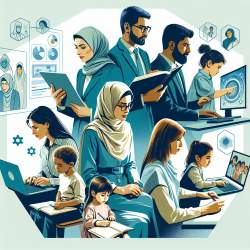In recent years, the field of special education has seen a significant shift towards more efficient and effective ways of supporting children with special needs. This transformation is particularly evident in the realm of Individualized Education Program (IEP) planning and meetings. As government health regulators, your role in overseeing these changes is crucial. One of the most promising advancements in this area is the advent of online therapy services, such as those provided by TinyEYE.
IEP planning is a meticulous process that requires the collaboration of various stakeholders, including educators, therapists, and parents. The goal is to create a comprehensive plan that addresses the unique needs of each child. However, this process can often lead to burnout among professionals, particularly when traditional, in-person methods are used. The demands of scheduling, travel, and face-to-face meetings can be overwhelming, leading to decreased efficiency and increased stress.
TinyEYE's online therapy services offer a solution to these challenges. By leveraging technology, we provide a platform that facilitates seamless communication and collaboration among all parties involved in IEP planning. This not only reduces the logistical burdens associated with traditional methods but also enhances the overall quality of the IEPs developed.
Key Benefits of TinyEYE's Online Therapy Services
- Accessibility: Our online platform ensures that all stakeholders can participate in IEP meetings from any location, eliminating the need for travel and making it easier to coordinate schedules.
- Efficiency: The use of digital tools streamlines the IEP planning process, allowing for quicker data sharing, real-time updates, and more organized documentation.
- Quality of Care: Our licensed therapists are highly trained and experienced in conducting speech therapy evaluations and other assessments online, ensuring that children receive the highest standard of care.
- Burnout Prevention: By reducing the logistical and emotional burdens associated with traditional IEP meetings, our services help prevent burnout among educators and therapists, allowing them to focus more on delivering quality care.
How It Works
Our platform is designed to be user-friendly and intuitive, making it easy for all participants to navigate. Here is a step-by-step overview of how TinyEYE's online therapy services can be integrated into the IEP planning process:
- Initial Consultation: We begin with an initial consultation to understand the specific needs of the child and gather relevant information from parents, educators, and other stakeholders.
- Speech Therapy Evaluation: Our licensed therapists conduct a comprehensive speech therapy evaluation online, using a combination of standardized assessments and observational techniques.
- IEP Development: Based on the evaluation results, we collaborate with the IEP team to develop a personalized plan that addresses the child's unique needs. This includes setting specific goals, outlining necessary services, and determining appropriate accommodations.
- Ongoing Support: We provide ongoing support and monitoring to ensure that the IEP is effectively implemented and that any necessary adjustments are made in a timely manner.
Case Study: Success Story
Consider the case of Emily, a seven-year-old child with speech and language difficulties. Prior to using TinyEYE's services, Emily's IEP meetings were often delayed due to scheduling conflicts among team members. Additionally, the in-person evaluations were time-consuming and stressful for both Emily and her parents.
After transitioning to TinyEYE's online therapy services, Emily's IEP meetings became more efficient and less stressful. The ability to participate in meetings from home provided a more comfortable environment for Emily and her parents. The digital tools used by our therapists facilitated quicker data sharing and more organized documentation, resulting in a more comprehensive and effective IEP. Most importantly, Emily received high-quality speech therapy that significantly improved her communication skills.
Conclusion
As government health regulators, it is essential to recognize the potential of online therapy services in revolutionizing IEP planning and meetings. TinyEYE's innovative approach not only addresses the logistical challenges associated with traditional methods but also enhances the overall quality of care provided to children with special needs. By reducing burnout among professionals and streamlining the IEP process, our services contribute to more effective and efficient support for these children.
We invite you to explore how TinyEYE's online therapy services can be integrated into your existing frameworks to improve outcomes for children with special needs. Together, we can create a more inclusive and supportive educational environment for all.










